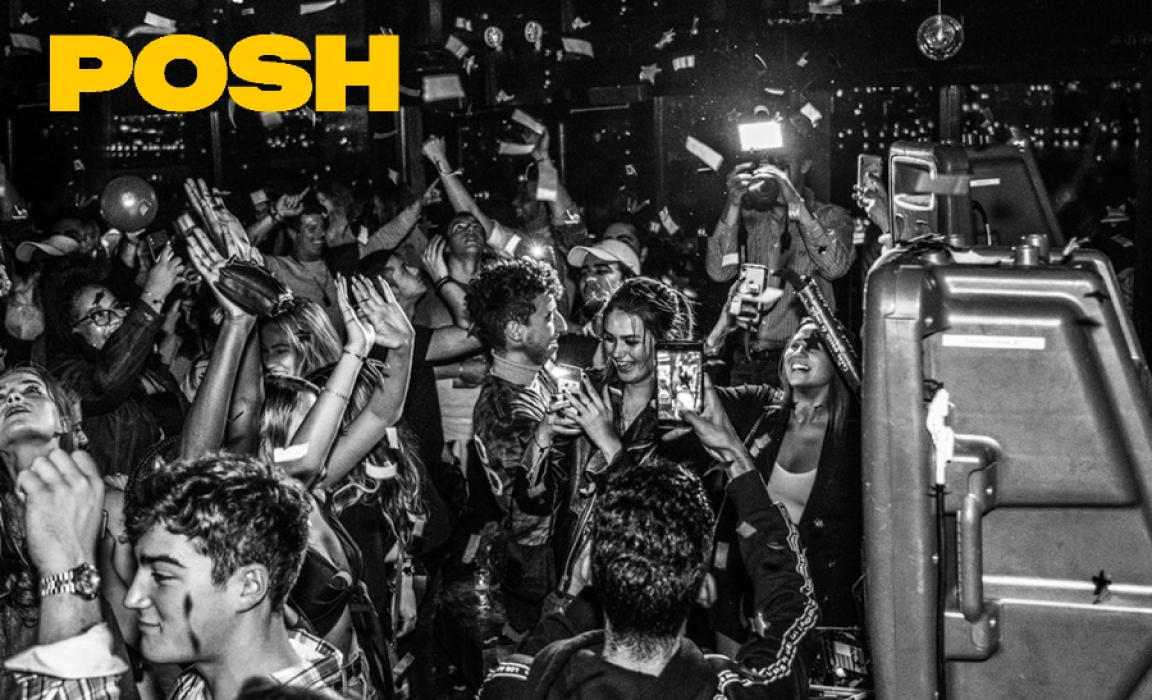If you’re a freshman at NYU, you’ve probably heard of or went to a welcome week party. The ear-ringing music, sweat-drenched bodies, and overpriced drinks are new and exciting at first, but become tiresome after half an hour of sweating off the alcohol. You go home, shower, and wake up in the morning. You realize that it was a disappointing night after all: you never met the complete strangers and hit it off like in the movies – in fact, you don’t even remember the names of all the people you met.
If that sounds familiar to you, you’re not alone. It was how Avante Price, CEO and Cofounder of POSH, and Eli Taylor-Lemire, CTO and Cofounder of POSH, felt. POSH is an online venues ticketing platform that aims to improve the nightlife ticketing experience, but it’s also so much more.
When I walked into the office of POSH on Lafayette and Grand, I was struck by the youthful and simple setup that screams “startup”. A big wooden conference table, a couple of computers, some grey bean bags stacked in front of a TV, and the big yellow logo of “POSH” on the wall greeted POSH’s visitors. Avante was the only one there, in front of him sat a laptop, coffee, muffin, and Ashlee Vance’s “Elon Musk”.
Avante is a senior at NYU Stern studying Finance and Marketing, but he’s taking the semester off to pursue POSH full time. He has been an entrepreneur since he was 14 when he started his first startup ChoreBug, a platform connecting high schoolers looking for odd jobs and employers who need a helping hand around the house. However, Avante doesn’t like the term “serial entrepreneur”. “Serial is never positive, like serial killer, serial murderer,” Avante jokes, “and also it means you’re not putting all your time into one business.” It’s safe to say that Avante is all in on POSH.
Avante is also a DJ of 12 years. In fact, his father is a DJ, so Avante has been exposed to the nightlife industry for as long as he remembers. Naturally, when Avante arrived on the NYU campus, he found venues to DJ at and got involved right away. “I got fairly tired of being treated poorly in the industry,” says Avante, “…that’s when Eli and I started POSH – just to throw events and not have to work for other people.”
Eli is is a junior studying Cinematography and Film/Video Production at Tisch. He used to be a freelance videographer, so Eli was actively involved in the nightlife industry as well. When I asked him where he learned the technical skills of development, Eli informed me that he too is a serial entrepreneur. Eli’s edtech startup Stumped helps create positive and authentic student-teacher relationships, and his role as CTO there taught him a lot about product development.
After hosting some events and having some success, Avante and Eli decided to build an in-house ticketing platform for their events in order to avoid using the dull, vanilla Eventbrite platform. The result? It doubled their sales. Avante and Eli got a taste of the potential of what they’ve created, and their event hosting business was starting to gain traction as well. But then, COVID hit.
“We couldn’t do the events at all,” recalled Avante, “so we took all of the COVID months just to hunker down and realize the value of the tools we had.” Avante says he thinks being shut down by COVID was a blessing in disguise for POSH. Without it, POSH might just be another event-hosting company looking for venues every weekend. Instead, the pandemic gave Avante and Eli the time to reapproach their business as a tech startup rather than a nightlife startup. “We [just] wanted to throw parties and make some quick money,” Avante recalls, “…and have some cool stories to tell. But as soon as Eli wrote a few lines of code, we realized we had something bigger in our hands.”
Fast forward to today, POSH is a SaaS platform targeting both the end users – those helpless NYU freshmen at Welcome Week parties – and the curators – the bosses of the mean bouncers at Blue Midtown. It charges a premium on the ticket buyers and offers its services for free to the event hosters. For both the end users and curators, POSH makes ticketing events much more “swaggy” and interactive.
I asked about POSH’s product, and how it’s differentiated from competitors like Eventbrite or Nightout. Avante responded: “It’s a ticketing platform that you [the curator] can white-label, make your own, gather more data on your attendees, and reengage your attendees with our marketing tools.” For example, if you go on Eventbrite, on every page there is the Eventbrite logo on the top left, a white background, and a bunch of aerial text. There’s no difference on any page except for the attached flyers. “There’s no coolness factor,” Avante concluded. In comparison, POSH’s website is a sleek, dark theme with bright yellow text, and gold confetti when you first go on the site. Even more, a curator who comes to POSH for ticketing will get their own customizable yet user-friendly page where the focus is on their logo, not POSH’s or Eventbrite’s. It won’t have the plain white background and black aerial texts, but instead a color scheme matching that of the event’s flyer and interactive hyperlinks.
That’s only the first differentiator. POSH also collects a lot more data than its competitors. POSH scraps up emails, phone numbers, and even Instagram tags. With these data, POSH creates something Avante calls the “Instagram guestlist”. “We scrape [the end users’] following and profile pictures, and if you want this on as the curator, …everyone that’s going to your event that’s bought tickets is displayed as a guestlist, in order of highest followers to lowest followers,” describes Avante, “so when other people goto [the curator’s] page and see, ‘wow, this 400-thousand-follower influencer is going’, or ‘this kid I know is going’, …that incentivizes more sales.” As for the attendees, they won’t have to worry about awkwardly whipping out their phones in the middle of the club to get someone’s contact information. They also have the chance to meet people with similar interests before the event and go as a group.
The third innovation POSH has is its CRM or Customer Relationship Management system. With all the data collected prior to the event, POSH uses Salesforce to offer curators an attendee list. The curators can text or email blast their attendees, as well as segment them into groups like “high spenders”, “low spenders”, and “free VIP crowd”. This allows the curators to market future events accordingly. This solves a big pain point for promoters, who often find themselves aimlessly posting event links on their social media pages and texting a bunch of people individually on Thursday night trying to get a turnout for tomorrow.
Other cool features like custom table maps, payment plans, and instant payouts to curators set POSH apart from the competition. “But that’s only right now,” clarifies Avante, “…in six to eight months the idea is to… provide social value before and after the event takes place.” POSH looks to expand their social features so that when a user buys a ticket on POSH, they can chat with people going to the same event, and see what events other people are going to. Eventually, POSH wants to become a kind of social media platform niched within the nightlife industry. “If your attendees think it’s cool when you list events on POSH, then you’re going to list every event on POSH,” concludes Avante.
Even further down the line, POSH wants to decrease the barrier-to-entry of throwing parties, and handle the logistics with automation. That way, everyone who wishes to host an event can do it with swag and ease. When this happens, POSH won’t just be going after the industry’s existing market shares, it will be increasing the size of the event-hosting market as a whole.
I could physically sense Avante’s excitement just talking about his vision, but it’s not without its challenges. One big problem POSH faces is competition with other companies that have the first-mover advantage. Avante unfolds the issue: “How this industry works is… [Eventbrite and Ticketmaster] got a lot of market shares really early because they were the first in the game, and then they paid large, upfront lump sums to big users to exclusively use them for a twelve-month period.” For example, Ticketmaster would go to Madison Square Garden and say, “here’s $10 million dollars, sign this contract.” To the managers at the Garden, they don’t care about the marginal difference in ticketing platforms – Justin Bieber is going to sell out whether on Ticketmaster or Seatgeek. For Avante and POSH, it’s hard to even get meetings with big venues without the upfront cash, which is an impractical expense for a startup. In short, POSH has the superior product but gets cut off by large corporations with deep pockets.
At this point, Eli walks into the office. He is wearing a blue sweater and jeans. I asked him about his journey from being the sole developer to managing a team of four full-time and two part-time engineers. “It feels very rewarding,” says Eli, “…collaborative work is much more interesting than working by yourself. And it’s also really exciting when you hire people who are more talented and smarter than you are, you get to learn a lot.” Eli was the sole developer for the first year, and he really shaped the artistic vision for POSH. Eli’s film background blended with his technical knowledge results in an obsession with User Interface. “Design, business, film, everything comes back to telling a story,” remarks Eli, “UI should always tell a story the same way film always tells a story, …they’re super connected.”
Working at a startup in the nightlife industry comes with its perks. Just this past summer, Avante and Eli were traveling the world, making connections with nightclub owners in Miami, Los Angelos, London, and Ibiza. When I asked the founders about their work-life balance, Avante expressed his newfound attitude towards “partying”: “It destroyed the idea of what being social means in my head. Whenever I go out, it’s always with the angle of ‘who am I getting involved with POSH’.” Eli expressed his definition of “work-life”: “When you’re in a startup where everyone is twenty and is friends, your social life is the company.” He even jokingly compares POSH to a “fraternity that’s running a business”.
Regardless, Avante and Eli are making a lot of progress. POSH has almost doubled its team since May – now with 12 employees – as well as moved into a new office. This came after raising a $100k pre-seed round at a $1 million pre-money valuation. POSH is actually finishing up a seed round funding of $1 million from angel investors who can help POSH with legal services and growth, which will allow the company to build up its social features. Both founders are very excited for what’s to come for POSH.

